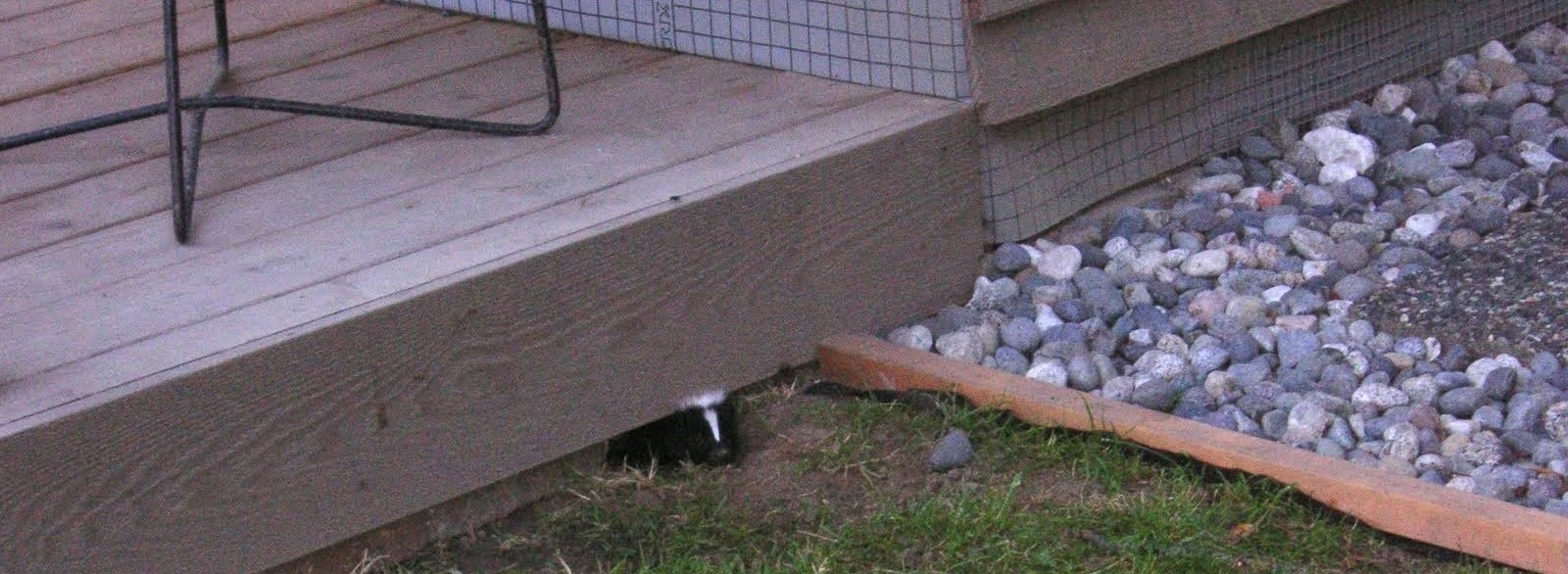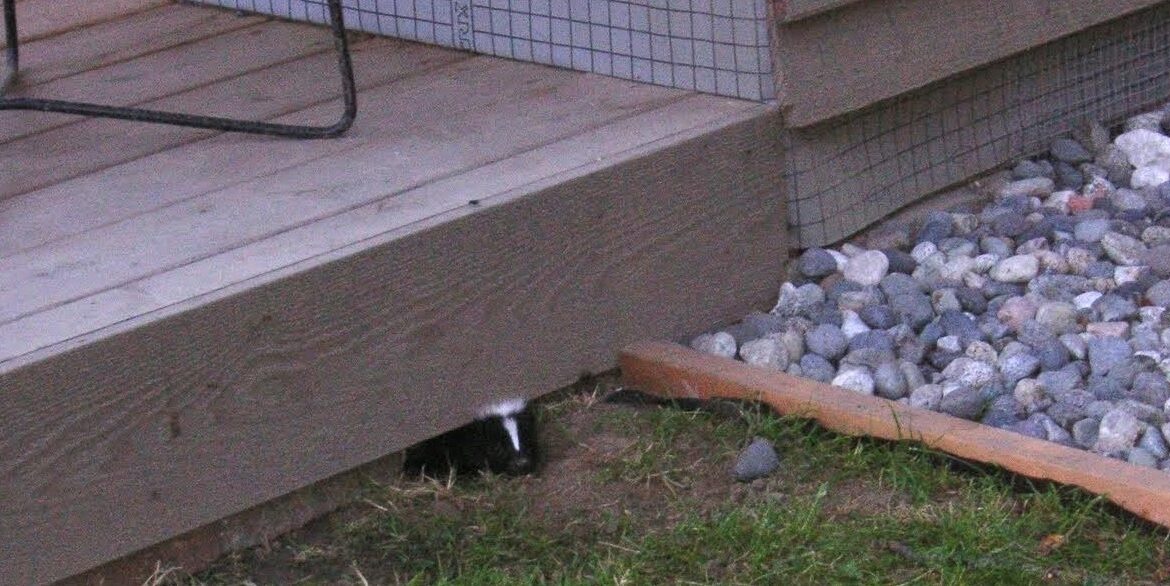When skunks begin nesting under decks, in yards, or near homes in Anoka County, it’s imperative to understand their behavior, especially during the mating season. Skunk mating behavior can play a role in how these animals interact with both people and properties. With Skedaddle’s experience and attention to wildlife patterns, we’ve seen firsthand how wildlife mating habits impact homeowners dealing with skunks in Blaine.
To shed light on this curious question, we’ll explore whether skunks mate for life, their unique mating habits, and how their behavior influences their presence around homes in Blaine and throughout Anoka County.
Skunk Mating Behavior
Skunks exhibit fascinating but non-monogamous mating patterns. Unlike some species that pair for life, skunks are polygamous. This means that a single male skunk mates with multiple females during the breeding season. Male skunks don’t settle down with one mate or take part in raising their offspring. Instead, they prioritize finding as many mates as possible.
A Seasonal Search for Love
Skunk mating activity typically peaks between February and March for striped skunks, the most common species in Anoka County. During this time, males roam significantly further than usual, sometimes traveling up to five miles from their dens to locate females. This is a drastic shift from their usual habit of keeping close to their dens, an indication of how instinct drives their mating habits.
The Role of Scent in Attraction
During breeding season, female skunks emit distinctive musk-like odors as a signal to potential mates. While this scent is milder than the defensive spray they are notorious for, it still contains potent chemical markers that males can detect over long distances. It’s nature’s way of ensuring that mates find each other in the vast, snowy landscapes of Blaine and beyond.
Notable Traits of Male Skunks
Male skunks behave more aggressively during the breeding season as they compete with other males for mates. This competitiveness can result in more visible skunk activity around your yard, leaving homeowners wondering about the sudden increase in sightings or smell. However, males move on after mating, leaving the females to care for the kits alone.
Do Skunks Raise Their Young Together?
While male skunks focus on finding partners, the responsibility of caring for the offspring falls solely to the females. Here’s a breakdown of how female skunks manage the breeding and rearing process:
Pregnancy and Birth
After successful mating, female skunks experience a gestation period of approximately 60 to 75 days. This means that skunk babies, or kits, are typically born between late April and early May. Litters usually contain four to six kits, but larger litters of up to nine are not uncommon.
The female skunk creates a secure den underground, often beneath decks, porches, sheds, or other sheltered areas near human habitation. She lines this den with grass and vegetation to provide a warm, safe space for her kits.
Raising Kits
When the kits are born, they are blind, deaf, and covered in a thin layer of fur. Female skunks nurse their kits for about six to eight weeks before gradually introducing them to solid food. During this time, the kits remain entirely dependent on their mother for protection and sustenance.
By the time the kits are two months old, they begin to accompany their mother on food-foraging trips. Hearing the rustle of vegetation or spotting small skunk families moving cautiously through yards in Blaine is a common springtime occurrence for many homeowners.
A Mother’s Protective Role
Female skunks are incredibly protective of their kits. If threatened, they will use their infamous spray as a defensive mechanism to keep predators or perceived threats at bay. This protective behavior underscores the importance of avoiding unnecessary interaction with skunks near their dens, as it may lead to spraying incidents that create long-lasting odors and discomfort around homes.
The Impact of Wildlife Mating Habits in Blaine
Understanding wildlife mating habits, particularly those of skunks, can help homeowners in Anoka County address potential conflicts or nuisances caused during this time of increased activity.
Increased Activity Around Homes
The mating season and subsequent raising of young bring noticeable changes in skunk activity patterns. You may notice the following:
- More frequent sightings of male skunks as they roam in search of mates.
- Burrows or dens under porches, sheds, or decks, indicating a female is preparing to give birth.
- Scratches or disturbed soil in gardens or lawns, a sign of foraging for food.
Behavioral Changes
Male skunks can act more boldly as they prioritize mating, resulting in sightings at unexpected hours. Similarly, females with kits may become more defensive.
Odor Issues
During mating season, strong skunk odors can become more common due to increased activity and potential defensive sprays. These issues often arise when skunks cross paths with pets like dogs or with residents surprised by their presence in yards.
Why Skunks in Blaine Choose Your Property
Skunks are skilled at identifying safe, quiet locations for birthing and raising kits, and residential areas in Blaine often provide the ideal conditions. Here’s why:
- Decks and Sheds: These structures mimic natural shelters and offer protection from predators.
- Abundant Food: Grubs, insects, and even leftover pet food can attract skunks to your yard.
- Limited Human Disturbance: Yards with less activity or secure fencing create a sense of safety for skunks.
What Homeowners Can Do About Skunks
For Blaine residents dealing with skunk activity, taking proactive steps can reduce encounters and limit issues like lingering odors or dug-up yards.
Yard Maintenance Tips
- Remove debris piles or overgrowth that could serve as potential den locations.
- Secure food sources by keeping trash in sealed bins and removing pet food at night.
- Inspect decks and sheds for entry points, and seal gaps to prevent burrowing.
Observe From a Distance
If you suspect that a skunk is nesting nearby, avoid disturbing the den area. Female skunks can become aggressive if they perceive a threat to their kits.
Humane Solutions Only
At Skedaddle, we specialize in providing humane and effective skunk-free solutions. Using safe practices to resolve skunk-related concerns safeguards both anyone on the property and the skunks themselves. With experience in skunks in Blaine, our team understands the unique skunk challenges faced by homeowners in Anoka County.
Contact Skedaddle for Safe Skunk Solutions
Skunks may not mate for life, but their mating and nesting habits can leave lasting effects on your property. At Skedaddle, we take the guesswork out of dealing with skunks in Blaine. With over 30 years of expertise in safe and humane wildlife control, including solutions tailored for our Anoka County neighbors, we’re here to help.
Whether you’re dealing with skunk odors, burrows, or defensive behaviors, our team of professionals is ready to assist. Call us today to reclaim your yard and set up your personalized skunk solution plan.




